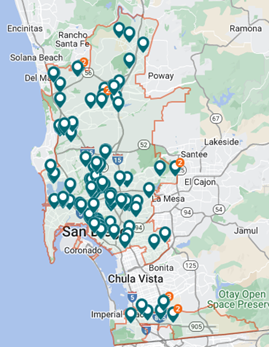

Today’s blog post is by Jericho Urmenita, an Orion Talent Recruiter, USMC Veteran, and USNA graduate. In today’s post, Jericho outlines a civilian salary guide for Junior Military Officers. Check out Jericho’s other blog posts on Most Common Civilian Jobs for Junior Military Officers by MOS, PMP Certification, and How to Succeed in Business Consulting.
Lets face it, most folks tend to steer clear of talking about money. Is it a fear of looking too statusy? Or maybe not having enough status? Most people just don’t want to show their cards. Well in this post, we’ll be ripping off that Bandaid! This is a necessary conversation in the job world and one that many folks have lots of questions about.
It is with that in mind, that I have decided to format this one as a FAQ for the top things candidates want to know about with how to navigate their conversations about salary.
Question: Should I tell a Recruiter what I make and what I want to make?
Answer: YES!
It is common for candidates to try and hold their cards close. But I believe that comes from confusing Hiring Managers with Recruiters. While we have the same goal of filling that role, our intent with that salary is VERY DIFFERENT.
Recruiters are generally trying to MAXIMIZE your salary, because they are in your corner and because (let’s not dance around it) we get paid more the higher the salary you end up landing (and not out of your salary, by the way!). That means we’ll always fight you as high as we can without busting.
Hiring Managers are trying to MINIMIZE your salary, because they are in their companies’ corner, and the name of the game is getting the lowest budget hire possible.
Think about it. If you are selling your house, you wouldn't keep your asking price range a secret from your agent, would you? Of course not! You would let that agent maximize the buyer’s price (the company you’re interested in working for) for a realistic number that the agent thinks they can land for you. The same goes for Recruiters, my friends.
See? It's easy to talk about how we make our living.
Question: What salary should a directly transitioning military member generally be looking for?
Answer: Level of leadership and skills will dictate.
Now before we get into this, I know there are folks out there that heard of a buddy of a buddy that got into Lockheed Martin for $150K as a Navy Lieutenant. Those are indeed out there, but that’s not average, my friend! And average is what we will be looking at here. These are GENERAL ranges of typical placements we see for military officers directly transitioning. For the purposes of this list, “with specialty” means folks with relevant degrees or direct MOS relatability.
O-2/O-3: $70,000 to $87,000
Low end: General leadership or entry-level opportunity to use an Engineering degree.
High end: General leadership usually backed by a relatable degree/MOS.
O-2/O-3 with specialty: $85,000 to $120,000
Low end: Specialty leadership using MOS (i.e. Maintenance Officer to Maintenance Manager).
High end: Specialty leadership backed by specialty degree. This is usually the territory of Engineering Program/Project Managers or Construction Project Managers. Strong communicators will also see this range with sales or business development roles.
O-4: $90,000 to $110,000
What!? Why is the high end lower than a specialty O-3? We’ll talk about that.
Whereas you have a broader scope of leadership experience from the military, you are now too far separated from your Bachelor’s Degree for that to impact your salary. I find most Hiring Managers are usually willing to factor in a degree from around 5-7 years ago, max. This is especially true for Engineering. For example, as of this year I earned my Engineering-based degree 8 years ago, and the programs I learned to do CAD modeling on are now obsolete. This means that, were I to go after an Engineering role, I am leveraging leadership and a general understanding of drafting but would need to be taught all the current programs the industry uses.
A company just does not pay top dollar for someone they need to teach. This is how that lower average comes about. The bright side is, a Master’s degree can sometimes get you right back in the fight, but make sure it makes sense! Check out our blog post on the Ultimate Guide to Veteran MBAs.
Low end: Broad scope leadership for teams of direct plus indirect reports.
High end: Broad scope leadership with more profitability influence and possibly talking with clients and customers.
O-5: $100,000 to $130,000
This is high earning potential, and you earned it! I must address, however, a not-so-pretty truth about the low end, because it’s not all rainbows with this one. I peg it at $100K, because that’s about the bottom end that I see O-5’s considered for because of their seniority, and that is a decision by the companies usually. This is because anything lower than that in middle management, the person you would report to is probably younger than you. While I don’t personally think that should matter, the truth of it is, companies are very rarely willing to deal with the potential friction (i.e. a slick 30 year old instructing a 20 year combat veteran with rental property in Topsail Island and kids in high school. Just not a situation people want to deal with). This means that while your earning potential is higher on average, the number of jobs available to you at that range can be frustratingly limited at times. Something to consider.
Low end: Senior-level cross functional leadership leveraging command time.
High end: Strategic level business leadership entering the territory of P/L responsibility.
Question: Will I take a pay cut when I get out? I don’t want to…
Answer: Probably, but not in all cases!
My friends, I took a pay cut! I like to think I’m not better or worse than any of you when you first got out, but it is indeed difficult to match, especially if you are factoring in BAH. A Company Grade Officer getting out in California with CA BAH rate made north of $85K when I got out so, with what I said above about ranges, you are already just about topped out for what is translatable. This means that jobs at that level will be fewer and far between, with the bulk of opportunities probably around $80K. If you go for Operations type roles, the likelihood of a pay cut for you is pretty good, unfortunately.
Fear not, though! You don’t have to stay there. Military candidates tend to out pace their counterparts promoting to higher level roles very quickly. It is common for us to place things like Site Managers then hear from that person a year or two later as a General Manager wanting to hire from us!
So what if you don’t want to have a pay cut? What are your options? Usually you have to specialize. When I got out, as a Combat Engineer with the right degree, I went for a Construction Superintendent position going for, how ‘bout that, $85K. I also went for some Account Manager/Sales/Business Development roles with a strong base salary and high commission potential. That would be your other strong bid for success.
Question: What salary should I ask for when I apply for a job?
Answer: Stay in the middle unless you can justify the high end.
Indeed, we all shoot for the stars in lots of ways, but in the job world, be real about where you fall in the range advertised. That means if you can only hit the soft skills (leadership, organization, mission accomplishment ect.), you will very likely be safe in the middle for that role. I’m talking to my fresh-out-of-Company-Commander types in this case. Raw leadership ability, while it is a key ingredient in getting you those manager roles, is by far not the only factor. Industry relatability may get you an edge for asking more (Logistics Officers going for Logistics Manager), but you should still tread lightly at middle-high. Good news is many MOSs have direct translatability for that pay bump. Check out our other blog post on what those MOSs look like.
How about that high end for the job you want? You’ll have to be able to hit the specifics for that company. This could be:
-
Same industry exposure, i.e. chemical production to chemical production or 3PL to 3PL.
-
Proficiency with their software, i.e. SAP, WMS, AutoCAD, SolidWorks.
-
Similar size and scope, i.e. size of team, size of warehouse, projects value or type of project.
-
Specific degrees or certs.
Understandably, a company pays top dollar only for someone they will generally not have to train for the role.
And what if you wanted to keep going? Dare we say, ask for beyond the top advertised range? We have seen it done successfully, but keep in mind that as you push the limits beyond the top advertised range, salary becomes like Blackjack; you can go too high and bust (your offer gets pulled off the table, which we have also seen)! So how high is too high? I generally see that about 10% above the top dollar advertised is the ceiling for most employers. Keep in mind too that you should be ready to justify every percent over asking! This is a matter of budget, my friends. It's not a personal attack against your self-worth if they go lower than you think they should. You might be a Ferrari, but if that company is looking for a good old workhorse Ford, they just aren’t going to pay for you. You’ll need to find someone willing to pay Ferrari level money.
Question: Question: I’m retiring, and I don’t really want to take a pay cut if possible, so is $120K doable?
Answer: Possibly, but are you looking to supplement or is that your full ask? Let's break this down.
Retiring folks have a couple different considerations than the average transitioning military member.
$120K is the most common ask for retiring folks and makes sense because that's about the base salary for an O-5 at 20 years. However, we should consider your already established income streams. Let's take our retiring O-5 example. (Please note these are only estimates.)
Pulling O-5 retirement? That's about $60K/yr
50% disabled? Another $24K/yr on top of that.
That's about $84K/yr to live off your past efforts. So the question is:
Are you seeking to supplement up to $120K/yr? This would then be a $36K/yr job like working at the local bait & tackle shop. Low stress, low time commitment, home every night with your spouse and kids. I HAVE seen people do this. My own dad was a substitute teacher for a while after the Navy for flexibility. Aren’t we all looking for a little less stress and more time after the military? Retiring folks are in a unique position to pull that off and still live comfortably.
Or are you trying to make that $120K flat out? Like I said above, this would be a high level Ops role and is certainly available to you. However, high stress and more time away from home. You are also asking to make over $200K per year with your retirement included, which adds some additional considerations. In California, for example, (I know, this is the harshest example but I live here, so it’s the most familiar to me) you would be at the 9.3% bracket which means you give the Golden State $15,602 right off the bat with how they calculate. Plus a $200K household is no longer eligible to contribute to some types of IRAs, so hopefully you have other plans to get that tax protected 7%+ return. I am not saying more money is bad, I am just saying you should understand the changes in pressure that sort of income brings.
Either way, your salary “ask” dictates how much of your time you sell and for what value. You were excited for more time when you got out right? My advice is to keep that in perspective as you go through the numbers.
Question: When and how do I negotiate the salary?
Answer: Timing depends but ONLY if they offer you lower than you asked, if ever that came up in process.
Going at it with a Recruiter is a little different that going at it alone. With us, we already know the range the company is willing to play with and can advise you on what we can realistically ask for based on qualifications. Usually most of the negotiation in this case happens at the front end. We pull out all the stops sometimes and can get a company to interview at high salaries by doing narrative letters, getting class lists for a degree, modifying resumes, or even just bargaining for a low time commitment phone conversation for you. That’s why, with all that work, you should NOT ask for more money right at the end. That would be like taking your $80 price tagged item to the counter and the cashier saying, “Actually it's $90 now that we know you like it.” That’s how job offers get pulled.
Now, there is a gray area that a Recruiter can do for you to get a higher salary if there are two roles at different levels. For example, you want the $90K Production Manager role, but they tell us you are more of a fit for the $75K Production Supervisor role. We would submit you for both to get you in front of them, but then it’s up to you to fight in there for the higher level role that they might not have given you access to if we went for it straight.
In the case that they offer lower than your original ask, that’s where we would jump back in and help you do the justifying for the higher pay. But only once! When you get that modified letter back with the higher number, I highly discourage you from asking again. If you feel they are still too low, it’s time to move on.
And in the case of you going at it without a Recruiter? Usually no one talks about salary until the end in that case, so that’s where you’d do your negotiations along with copious amounts of justification for why you deserve more. But again, only once!
Question: Aren’t all Sales roles commission only, so if I have a bad month my family will starve?
Answer: No!
I thought I’d address this one because it does come around fairly often. Ops role pay is easy enough to understand, but how does sales pay work? For starters, not all Sales roles are commission only!
And they aren’t all door-to-door either, while we’re talking about this. The vast majority of our Sales roles are business to business (B2B) which means you do NOT sell directly to a consumer (at their door) and instead talk to key decision makers at factories, hospitals, power plants, ect. This is because you are typically selling something like capital equipment or pharma, meaning, your neighbor down the block is NOT your customer.
Now in the case of how you get paid, it goes like this: base salary plus commission based on performance typically paid monthly. For example, a typical pharma role might advertise as an $80K base plus 30% target commission. That means you are guaranteed the $80K and any commission you make on top of that, to the tune of $24K in this case, is up to you for the taking, but that part is not guaranteed. Your potential is then $104K total at target performance and you can actually make more usually if you rock it.
Now, there is something called a draw, which you might hear about, where the base drops. In the example above it might look something like the base drops to $50K after one year, but now your commission target is 200%, meaning your potential has now raised to $150K. At the end of the day, most companies don’t want you to risk missing a bill payment if you have a bad month.
Statement: That role sounds great, but it depends on the cost of living.
There was no way to phrase this as a question but I thought this very important to go over as this is the whole reason people ask for higher salaries! Most folks start this conversation by telling me about how expensive the area is for different roles we have in big cities. Trust me my friends, I live in California, so I totally get it. But, there is indeed a solution if you truly seek it! Sad part is, most people have not thoroughly thought through the solutions and instead identify just the roadblock without further analysis. Fear not, I’ll help you to not be that guy!
When you say "depends on cost of living,” be prepared to talk about a couple neighborhoods you've actually looked up rent/mortgage in. San Diego is indeed expensive, but there are 3.2M people making it work here, and they aren't all tech CEOs. Maybe you can, too!
For example, everyone knows that rent is expensive in San Diego. About $2700/mo in fact if you look up the city. But did you know that it is pulled from the downtown rate and mostly the affluent north county areas? And how many people are really looking to live downtown or up there?
La Mesa, however, which is a suburb 20 minute drive from the city center, averages around $2100/mo. The map below shows how a popular calculator from RentCafe excludes the bulk of La Mesa from a San Diego search so you would not see La Mesa rates if you just searched for San Diego.
Now, I’m not saying that’s cheap, but in this example it is nearly 23% lower than if you just looked up the major metro area of San Diego. Many commutable areas in your target locale have far lower rent/mortgage averages than the major metro area that the job is listed in. Check them all out!
So what about other factors like gas, taxes for that state, or other costs? You will find that most stock calculators online will only have those major metro areas listed so you will still have the same problem of possibly inflated rent/mortgage rates, which is a major variable for that calculation. I’ve got you covered!
Below is an equation that you can use to check out possible cost of living differences for areas you are considering. It’s not perfect, but it will get you close (I have tested this against calculators for major metros and found it is generally accurate).
Some notes on this equation:
REAL INCOME equals your actual take home money after major fixed expenses. You can compare by plugging in your current numbers and comparing against the numbers for the job you want.
Tax Rate must be a decimal for this to work. 9% must be plugged in as .09. I know, you know that, but I’m making sure your battle buddy knows.
Trips Per Year reflects capturing any remote potential. For example, in a full on-site role you would drive to work 250 times every year on average (5 days a week for 50 weeks). 50% remote means maybe you cut that to 125.
Orion Talent can help
From salary expectations to negotiation, Jericho’s guide is a great tool to help transitioning military and veterans navigate the complicated world of civilian salary conversations.
Along with your Recruiter’s expert advice, Orion Talent has additional resources to help you with receiving and negotiating an offer that has your best interests at heart.
Orion Talent is a major asset to you in your career search. Register with us today or reach out to Jericho to leverage our wealth of knowledge on salary.
Archives
- February 2026
- January 2026
- December 2025
- November 2025
- October 2025
- September 2025
- August 2025
- July 2025
- June 2025
- May 2025
- April 2025
- March 2025
- February 2025
- October 2024
- May 2024
- March 2024
- February 2024
- January 2024
- December 2023
- November 2023
- October 2023
- September 2023
- August 2023
- July 2023
- June 2023
- May 2023
- April 2023
- March 2023
- February 2023
- January 2023
- December 2022
- November 2022
- October 2022
- September 2022
- August 2022
- July 2022
- June 2022
- May 2022
- April 2022
- March 2022
- February 2022
- January 2022
- December 2021
- November 2021
- October 2021
- September 2021
- August 2021
- July 2021
- June 2021
- May 2021
- April 2021
- March 2021
- February 2021
- January 2021
- December 2020
- November 2020
- October 2020
- September 2020
- August 2020
- July 2020
- June 2020
- May 2020
- April 2020
- March 2020
- February 2020
- January 2020
- December 2019
- November 2019
- October 2019
- September 2019
- August 2019
- July 2019
- June 2019
- May 2019
- April 2019
- March 2019
- February 2019
- January 2019
- December 2018
- November 2018
- October 2018
- September 2018
- August 2018
- July 2018
- June 2018
- May 2018
- April 2018
- March 2018
- February 2018
- January 2018
- December 2017
- November 2017
- October 2017
- September 2017
- August 2017
- July 2017
- June 2017
- May 2017
- March 2017
- February 2017
- January 2017
 RSS Feed
RSS Feed






















